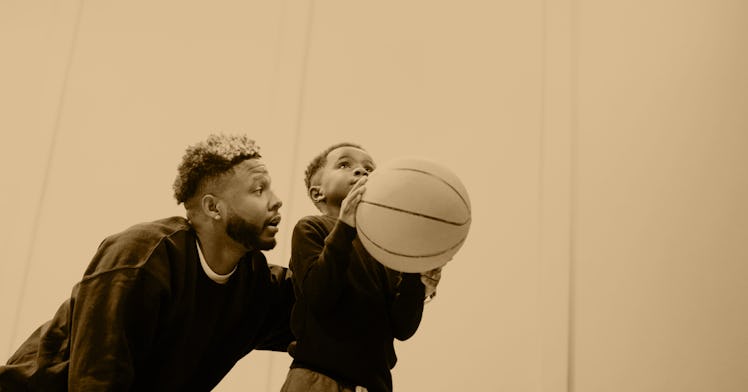Society Is Failing Its Boys. Here’s How Parents Can Help Save Them.
"It's easy to mistakenly believe that boys are hearty enough to weather the inevitable cruelties of their peers and the world."

The following story was submitted by a Fatherly reader. Opinions expressed in the story do not reflect the opinions of Fatherly as a publication. The fact that we’re printing the story does, however, reflect a belief that it is an interesting and worthwhile read.
It is easy for us to forget about the sensitivity and emotional complexity of boys, and to mistakenly believe they are hearty enough to weather the inevitable cruelties of their peers and the world. This simplistic notion is echoed in John Mayer’s song “Daughters.” After chronicling the way a girl can be hurt, he notes the difference for boys: “Boys you can break/you find out how much they can take/ Boys will be strong/ and boys soldier on…” While he notes that boys will be ‘gone without the warmth of a good woman,’ there is little emphasis on how boys, by their own nature and in their relationship with other boys and men, have the capacity and right to be vulnerable.
While it is wonderful that society has been focused on helping girls ⏤ empowering them not to feel like the ‘odd girl out’ and tackling issues surrounding ‘mean girls’ ⏤ boys experiences, unfortunately, have often been neglected. And by failing to zero in on this important aspect of a boy’s psychology, we not only do boys a disservice, but we also miss the boat in treating them with the kind of empathy that will truly help them become strong. Fortunately, this doesn’t need to be a zero-sum game: we can empower, support, and celebrate girls and boys at the same time.
Recent research by neuroscientist Allan N. Schore found that because boys develop slower neurologically ⏤ physically, socially, and linguistically ⏤ they have fewer tools to regulate and negotiate emotions and relationships. As a result, they actually require more empathic support than girls, and greatly benefit from the kind of attention and care that we often fail to provide. This completely flies in the face of the ‘boy’s don’t cry’ mentality that has often dominated the way our culture has approached our little men. And while we’ve come a long way with respects to toughening up our boys (See William Pollack’s Real Boys: Rescuing Our Sons from the Myths of Boyhood), by failing to take the time to notice how boys might be affected by mean behavior, we may be failing them in subtle but profound ways.
It is crucial to encourage and applaud boys for talking about and exploring their feelings with us, especially when they feel they have been mistreated. We need to make sure boys get the message that they have the right to feel hurt and angry, and that they have the right to be protected and supported when addressing these issues. Just as important, boys need to know that they aren’t alone in dealing with these issues, and that they don’t have to feel burdened by the obligation to be self-sufficient and invincible.
Boys need to be reminded that they not only have the right to feel hurt, but they also deserve to feel supported, empowered, and encouraged to stand up to their bullies with true strength and integrity. Boys often get mixed messages about the balance of being strong and vulnerable, and many of them are confused by the conflicting models out there today ⏤ and by the shifting landscape of gender dynamics. By empathizing with boys who have been hurt or mistreated and helping them to find constructive and empowered ways of negotiating this, we help them to become more three-dimensional and more fully human.
It’s also important to do within the framework of valuing boys and men as an essential and beautiful part of our culture. As a result of longstanding disparities and individual and collective trauma, it’s sometimes easy to forget how to approach this from a more neutral and positive perspective. Unfortunately, and understandably, boys can sometimes be approached from an ‘original sin’ mentality, one that presumes that they are somehow, from the start, prone to problematic, sinful, or oppressive behavior. I believe that while we need to be aware of these propensities in anybody, regardless of demographic, it is crucial to level the playing field and allow our boys to be viewed from a framework of openness, love, and genuine possibility.
I once remember hearing a quote from Margaret Atwood that said something to the effect that women will achieve equality when they are allowed to be as bad as men. In many ways, I think this was revolutionary in allowing women to have greater latitude to explore aspects of their character that were heretofore viewed as problematic, sinful, or inappropriate. I think that the converse applies here with boys. If boys can be allowed to be as emotionally sensitive as girls ⏤ to have the freedom and latitude to explore, express, and examine their emotional vulnerability ⏤ then, maybe, just maybe we will have truly achieved equality.
Michael Alcee, PhD. is a clinical psychologist and new dad living in Tarrytown, NY. He specializes in college counseling and the psychology of men.
This article was originally published on